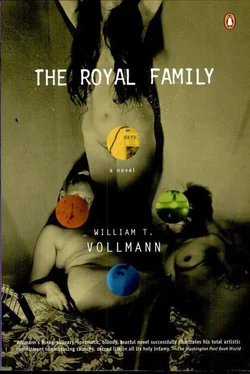Ceel, you think Mom is okay?
Well, I… I guess. She seems to be, the girl said, anxious or sleepy (in fact she was thinking that Mrs. Tyler looked very poorly, and she knew that if John were to ask her whether she believed that his mother would soon die she would truthfully answer: I can’t bear the idea of it), and then they passed the orchard where John had once made love with a girl named Mary, a girl from one of these hot still Delta towns; there’d been emerald grass beneath, no puddles the way there were in spring, and he remembered sparkles on the cool blue river like the drops of sweat on Mary’s forehead; and as he drove on, Celia gazing tolerantly upon Courtland’s pale white and grey buildings, upon the tiny pillared courthouse, upon big-tired farm vehicles rolling down the levee road, John found himself longing to make love with Celia right now, perhaps beneath this palm tree whose leaves were loose, glossy, dark like an excited lover’s hairy labia; but he extricated himself from his desire by convincing himself rightly or wrongly that such lovemaking would be an act of violation and exploitation, using Celia in Mary’s place as he had used her to be Irene (strangely enough, he didn’t think of Domino, either because her image would have scalded him or because she was so unique as to be a placeholder for nobody else before or since in his life). John remembered swimming past the Levee Cafe with little blonde Isleton girls who wore baseball caps in the water; he must have been very young then. And then he’d met Allie, the one to whom he’d husked his virginity in the speedboat, and then he’d found Mary, whose skin and soul were both as white as a new houseboat on the Sacramento River. Celia cleared her throat, allergically or anxiously, he couldn’t tell. Driving past Queen Anne’s lace so tall and white, John longed for Mary frivolously and desperately. He’d met her in China Mike’s bar in Locke. Her cunt had reminded him of soft-cut brown and golden fields. Did he comprehend that this Mary who touched him now wasn’t even Mary anymore, and that Mary had never been his memory, that all he felt now was a carnal ghost like one of the shadows which sometimes came down upon his brother like flesh in a black miniskirt walking, flesh in black high heels, flesh and a black purse, flesh and long red hair or black hair or the face of a sister-in-law or a Queen, meaningless flesh, to which all flesh is susceptible, because pleasure hides death? He tried to think of Celia, who left him cold, and of Irene, who left him cold, and then Celia smiled and touched his wrist very lightly with her long sensitive fingers and he was overwhelmed by love and guilt.
Ceel? he said, a little awkwardly.
What?
Do you feel like making love?
Celia looked away. — I think sex is wonderful when I feel safe and loved.
So you don’t feel safe? he said, trying to be angry, but unable to because the bitter taste of guilt remained in his mouth.
I—
Oh, forget it, he said. The pear groves were now an indistinct mass of life. Rich orchards looked up at the leveee, merging and blurring.
Uh, John, listen, I—
I don’t know, he sighed. Maybe I’m getting too stressed out over nothing. You think I’m a jerk, don’t you?
Then Celia was stroking his neck and saying: Yes, honey, yes I want to make love with you… — and John smiled in happy triumph.
And so in a wet mustard-yellow sunny fog they came to Locke with its smell of river-rot and old wood, its chamomile flowers, its dark damp plankwork spanning the gap from the weedy levee to the two-storey houses, some boarded up, some leaning, some with laundry hanging and dogs sleeping. The same sensations inspired in his brother by ageing prostitutes slowly going bust were felt by John in this weedgrown old Chinese town whose bleached ideograms hung like crushed moths in the blackened windows. They parked across from the marina and John led her down River Road past the Joe Shoong Chinese school whose walls were pale yellow and grey, their ideograms the color of teahouse smoke.
Lovely, said Celia.
You see? said John, waving his hand.
Ancient dolls grimaced at her from a dark window, and at Locke China Imports there were heart-shaped old doilies. Silver clouds weighed down white clouds. Birds and silent gnats were everywhere.
John took her to the Dai Loy Museum and paid a dollar for each of them so that beneath the leaking skylight he could show her how the giant, red-and-white-dot-studded dice used to be shaken for illegal gambling games of pai ngow. — You see all those white money chips on the tables? he said. Just think what it would have been like to win!
Did you ever gamble? Celia asked, amused by his excitement.
Well, one time Hank and I…
His voice trailed off. There was a cold and moldy smell. He pointed to a row of mahjong pieces laid out on a long black box. Sticks of ivory, black with ideograms and wheels and flowers, seemed to offer Celia some gnomic key to her “situation,” but she didn’t really believe in fortune-telling and anyway John was explaining something to her regarding the rich indigo blueprint of Locke in the old days with its numbered squares of fields.
She stared down at a dry-rotted old butterfly harp.
Now we’re going to China Mike’s to meet Ronnie, John said. That’s the whole point of this trip — for you to meet Ronnie.
They sat at the bar beneath the faded notice which read: WARNING: DRINKING BEER, WINE OR OTHER ALCOHOLIC BEVERAGES CAN CAUSE SEXUAL AROUSAL AND MAY RESULT IN PREGNANCY. He showed her the three baseball caps on the antlers of the stags’ heads, the dollar bills on the ceiling. He longed to order beers and greasy fries on the worn bar which glowed unevenly like the river; a second river, a glowing uneven river of copper, ran where the bar joined the floor.
Look, said John, grinning. There’s Ronnie himself. He’s a real character. Ronnie’s kind of my hero in a way. I remember the time I—
That would be yours, Ronnie was saying to another customer.
Smiling, John waited for Ronnie to notice him.
You’re perfect, Ronnie said to an old Chinese lady.
Celia had begun to feel anxious. John was drumming his fingers.
Almost got you with the bloody mary! Ronnie shouted to a tattooed Brady’s Boy.
Ronnie! John called out at last. Hey, Ronnie!
Who the fuck are you? said Ronnie.
John turned white. Horrified, Celia tried to speak. Ronnie glared viciously into her eyes and said: Shut up, bitch! Or do you wanna make the same mistake?
BOOK XXIX. Space Invaders
But the Light, since he possessed a great power, knew the abasement of the Darkness and his disorder, namely that the root was not straight. But the crookedness of the Darkness was lack of perception, namely the illusion that there is no one above him.
GNOSTIC SCRIPTURES, The Paraphrase of Shem, VII, 1, 10–15 (date unknown)
At the beginning of the new year there were floods in the farmland around Sacramento and dozens of homes went underwater to the eaves. — Those poor people, said Mrs. Tyler, shaking her head. — On the seventeenth Tyler was driving in to San Francisco and the flats just west of the river gleamed silver with mist and water, above which the railroad embankment shrugged its endless shoulder. White pickup trucks dazzled him with their unearthliness. Then above a long narrow green field a green billboard said MENTHOL. Inside garages and greenhouses, stale incandescent yellow glowed like sunlight through worn seashells. The road quivered under him as he sped most pleasantly alongside the divider-hedge.
It was a very cold January night at Leidesdorff and Commercial, where the triangular sign said A CULTURED SALAD. A man in livery passed, and his shadow stained the clean, empty street-wall which was otherwise hemorrhaging light. He half expected to see John, simply because this part of town was John’s kingdom. Granting the childishness of his conceptions did not dispell them. John did not appear. He felt disappointment and relief. Inside Boudin Sourdough, upended chairs went on and on like a chain of mahogany vertebrae.
Читать дальше












